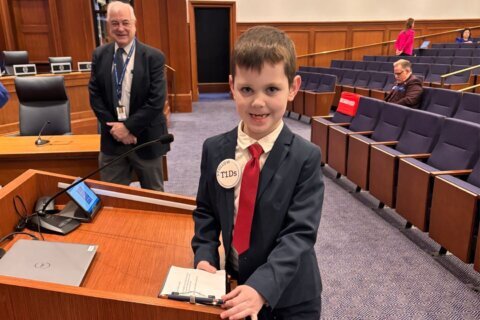This article was reprinted with permission from Virginia Mercury.
Virginia legislators, educators and parents were surprised to learn in the past few months how many schools failed to meet expectations under a new accountability system compared to an older system that showed most schools were accredited.
During an announcement on Friday about the Department of Education’s new Road to Readiness Hub to help improve student and school performance, the agency’s current reports showed most schools were meeting or are on track to meet expectations compared to a report presented in August demonstrating that more than half of schools lagged behind and required support, based on 2023-24 data.
Under the accountability system, schools are given one of four labels based on their performance: “Distinguished,” “On track,” “Off Track,” and “Needs Intensive Support.”
Schools considered “distinguished” are those that exceed the state’s expectations for growth, achievement and readiness, while those that need “intensive support” do not meet any of the state’s expectations. In addition, there are “on-track” and “off-track” descriptors that indicate whether schools are meeting or not meeting expectations.
“It seems like there is not [any] clarity around what we are talking about and what this new accountability system is actually looking at,” Sen. Ghazala Hashmi, D-Richmond, the Senate Health and Education Committee chair, told reporters on Friday, adding that the VDOE has not been forthcoming with its data.
“We don’t have the data ourselves to evaluate what these numbers constitute and what they represent,” she said, “and so that’s a real concern why there’s not the transparency we need in order to understand where our schools are actually performing.”
When asked about the data gap, Superintendent of Public Instruction Lisa Coons said on Friday that the modeling was “incomplete.” The August data was not finalized until Sept. 30, Coons said.
Based on 2023-24 data, the VDOE projected in August that 55.5% of schools were significantly “off track” and not meeting the state’s expectation for growth, achievement, and readiness, while current data shows that 34.7% of schools are “off track” and would need intensive support.
The hub’s launch on Friday comes as Gov. Glenn Youngkin’s administration seeks to provide the public with transparent access to preliminary data on school performance and resources to support students and schools.
“This new Road to Readiness embodies our commitment to high expectations, transparency, and prioritizing resources to those students and schools most in need,” Youngkin said in a statement. “Our school performance framework and this new resource hub reaffirm our commitment to empowering our teachers, partnering with our parents, strengthening our schools and most importantly, preparing every student for success.”
The administration believes the performance data was masked behind an existing system that showed an inaccurate picture of K-12 public education in Virginia, as identified by state and national assessments. Youngkin suggested the inaccurate picture was because of previous administrations’ decisions.
The hub is also in conjunction with the new accountability framework, which has been in the works for two years and was overhauled from the existing system.
Virginia Board of Education approves changes to accreditation, accountability systems
The new framework is intended to depict how schools are meeting all requirements set by state laws and regulations, and provide “timely” and “transparent” information on student and school performance, according to the VDOE.
Education leaders, including members of the Board of Education, said the existing system has been considered “vague” and fails to clearly state to the public how students are performing academically since its development in 2018-2019.
The new system also aims to improve the direction of state resources.
On Friday, Youngkin said he would commit at least an additional $50 million to support schools that were “most in need,” as well as an unspecified amount of additional operating funds for the Office of School Quality. The Richmond Times-Dispatch previously reported that the agency requested $125 million for the assessment system.
Data collection on assessments is underway, and full implementation of the plan – is set to begin in the 2025-26 school year.
Public speakers at Board of Education meetings and Democratic lawmakers have criticized agency leaders for using performance labels that they say have a negative connotation. They also said that they believe the overhauling of the system was rushed.
Speakers have also said that the changes would increase current inequities for students, and require teachers to earn additional certifications to teach accelerated coursework in middle school mathematics, science, history and social science.
English learners, which have been typically excluded because of the language barrier, will also be considered in the accountability calculations.
The previous rules allowed VDOE to exclude ESL students from their assessment for 11 months per year. Under the new rules, the agency can only discount ESL student data for three months of the year.. Under the previous regulations, approximately 35,000 students were excluded.
GET THE MORNING HEADLINES.
Virginia Mercury is part of States Newsroom, a nonprofit news network supported by grants and a coalition of donors as a 501c(3) public charity. Virginia Mercury maintains editorial independence. Contact Editor Samantha Willis for questions: info@virginiamercury.com. Follow Virginia Mercury on Facebook and X.







